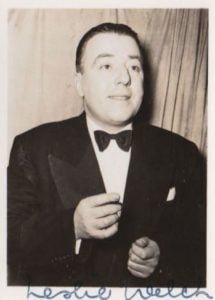 Often referred to as a walking sport, Leslie Welch became famous for his ability to answer almost any question on football, horse racing, and cricket. He played to packed music halls in the late 1940s and 1950s, bewildering audiences wherever he went. Millions tuned in to his radio shows and he was soon earning £11,000 a year. Then it all went wrong. He ended his working life as a £25-a-week accountant for the Department of Employment.
Often referred to as a walking sport, Leslie Welch became famous for his ability to answer almost any question on football, horse racing, and cricket. He played to packed music halls in the late 1940s and 1950s, bewildering audiences wherever he went. Millions tuned in to his radio shows and he was soon earning £11,000 a year. Then it all went wrong. He ended his working life as a £25-a-week accountant for the Department of Employment.
A brief biography
Welch was fascinated with facts and figures, says Dominic O’Brien in his book How to Develop a Perfect Memory. At the age of four, he was reading Wisden’s Cricketers’ Almanac and Ruff’s Guide to the Turf. He matriculated with honors from Latimer School, Edmonton, in history and mathematics, astounding examiners with the breadth and detail of his knowledge.
During the war, he was a tank commander with the Eighth Army in the Western Desert. One evening, his Regimental Sergeant Major got into a furious argument with another soldier about who won a Manchester Derby in the 1930s. Welch intervened in his inimitable cockney way. ‘Excuse me Sergeant Major, City won 3-1, goals scored by Tilson (2) and Herd. The teams were…’. Whereupon he proceeded to rattle out both line-ups.
In 1944, he was transferred to ENSA to entertain the troops with his memory skills. After being demobbed in 1946, he had his own radio slot, broadcasting to 15 million people on Calling All Forces. By 1952, he had a show on Radio Luxembourg called Beat the Memory Man. Sponsored by Bovril, the program invited listeners to phone in on-air and ask him questions. They got a guinea if he answered correctly, £25 if they caught him out.
Welch estimated that he had been asked over one million questions in his life. He made eleven short films with Twentieth-Century Fox, appeared in 4,000 radio programs, 500 TV shows, and eight Royal Command Performances.”
It all went wrong
In the late 1950s, bookings dried up. By 1960, Welch was a finance officer at the Holloway branch of the Department of Employment. On his retirement in 1972, he tried to make a come-back, landing a regular spot on Radio 2’s Late Night Extra. The switchboards were jammed with listeners trying to call in, but the memory man was soon forgotten. He died on February 8, 1980, aged 73.
In an interview with Ian Gilchrist of the Sunday Express, Welch talked at length about the abrupt end to his career. Nodding towards his wife, Kathleen, who was sitting in the garden as they spoke, he gave this assessment of his career’s untimely end:
It was her, see. She was my biggest problem. When I started on the radio, she didn’t want me to do this for a living. No, she wanted me to be at home at night. But things moved too quickly for her to stop them. The show was a hit straight away.
About 1957, the wife says, ‘Look, our two girls have married, we’ve got this house, just the two of us, and you’re not going to leave me alone at night anymore.’
Well, I like my home comforts, see. I sat on my bottom for three years, during which I finished up being seven of eight thousand pounds worse off. The number of bookings I turned down was nobody’s business. I had to decide whether to sacrifice my home life by going around Northern clubs, or whether to take the safe nine-to-five job.
The wife and I are opposites in many ways. And maybe that’s why we’ve stayed together for forty years. She’s a worry-guts, a pessimist. She dies a thousand deaths when I’m on stage. But she’s been a very dominant influence in my life and I am not going to sacrifice that for the sake of earning five or six hundred up North.
Anyway, have you ever been to any of these Northern clubs? People I was once proud to work with, household names, now go up and do fifteen minutes of sheer concentrated filth. I don’t want to follow that sort of act, I still consider myself at the top. There isn’t a better-known specialty act in the country than yours truly.
.

